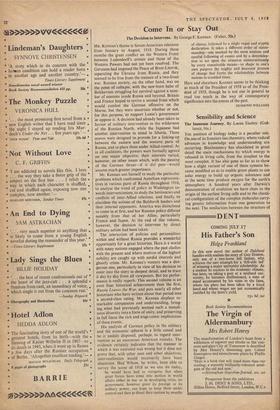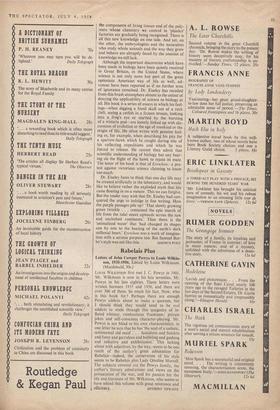Sensibility and Science
The Immense Journey. By Loren Eiselcy. (Gol- lancz, 16s.)
TtlE position of biology today is a peculiar one. On one of its frontiers lies chemistry, where radical advances in knowledge and understanding are occurring. Biochemistry has elucidated in great detail the main mechanisms by which energy is released in living cells, from the simplest to the most complex. It has also gone as far as to show how a slight variant of one of these systems be- came modified so as to enable green plants to use solar energy to build up organic substance and at the same time produce oxygen for the earth's atmosphere. A hundred years after Darwin's demonstration of evolution we have clues to the origin of the earliest living cells and to the chemi- cal configuration of the complex molecules carry- ing genetic information from one generation to the next. The similarities between the structure of
the components of living tissues and of the poly- mers whose chemistry we control in 'plastics' factories are gradually being recognised. There is all this new knowledge on one side. And yet, on the other, the embryologists and the naturalists who study whole animals and the way they grow and behave are abruptly faced by the amount of knowledge we still lack.
Although the important discoveries which have been made in biology have been quietly received in Great Britain, in the United States, where science is not only news but part of the great optimistic American way of life as well, ad- vances have been reported as if no further area of ignorance remained. Dr. Eiseley has recoiled from this brash atmosphere almost to the extent of denying the applicability of science to biology at all. His book is a series of essays in which his feel- ings—when digging a fossil skull out of a rock cleft, seeing a catfish in a frozen stream, looking into a frog's eye or startled by the bursting of a wistaria pod—are loosely linked up with dis- cussions of evolution or the age of mankind or the origin of life. He often writes with genuine feel- ing as, for example, when describing his pity for a sparrow-hawk which he caught during one of his collecting expeditions and which he was forced to release. He cannot then admit that scientific understanding of biology has any bear- ing on the flight of the hawk to rejoin its mate. The tenor of his book is that of Erewhon:- a pro- test against victorious science claiming to know too much.
Dr. Eiseley hates to think that one day life may be created artificially in the laboratory, and would like to believe rather the exploded myth that life came floating in on a meteor. This we can forgive. But the reader may wish that Dr. Eiseley had con- quered the urge to indulge in fine writing. How the purple passages pile up ! 'That slowly growing green .twinkle . . . contained the epic march of life from the tidal oozes upwards across the raw and unclothed continents.' Then there is the `animalized water' that 'had changed its shapes eon by eon to the beating of the earth's dark millenial heart.' Erewhon was a work of imagina- tion with a serious purpose too. But Samuel But-
ler's style was not like this. MAGNUS PYKE























































 Previous page
Previous page